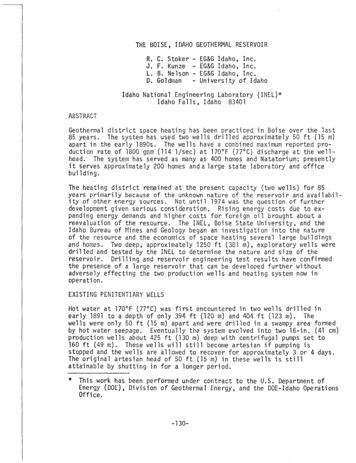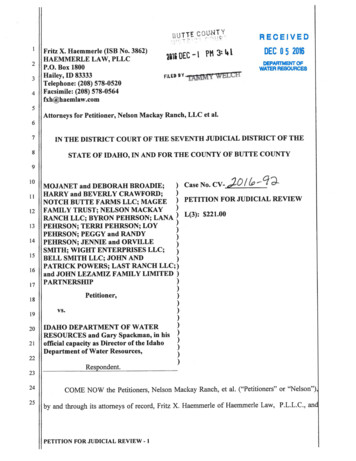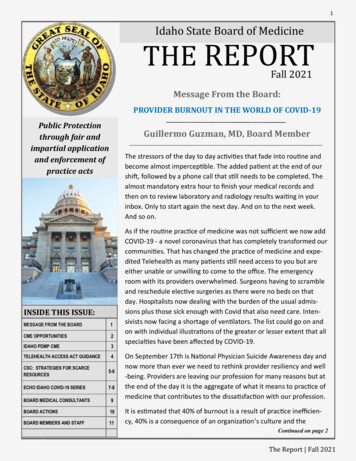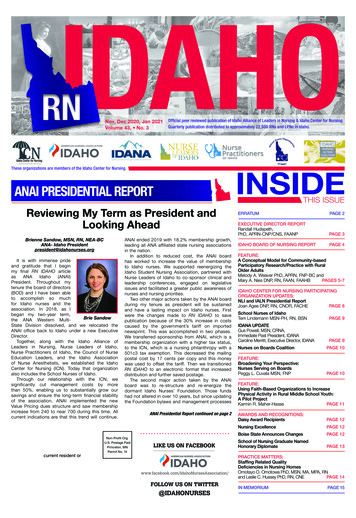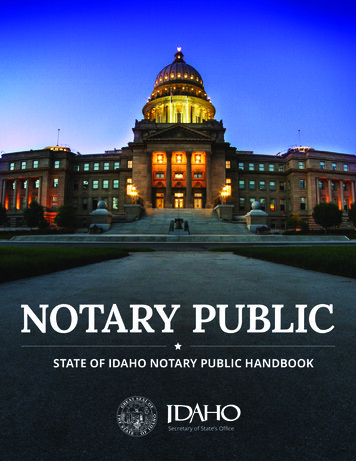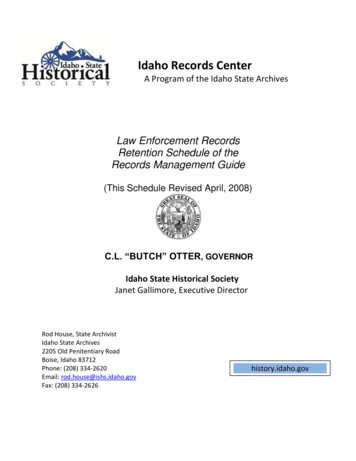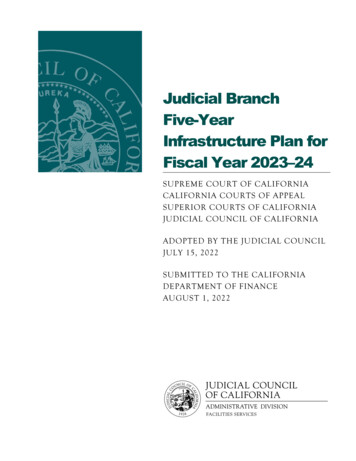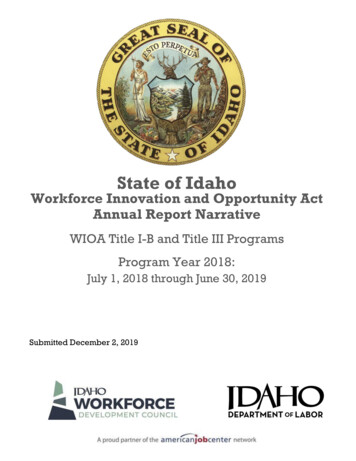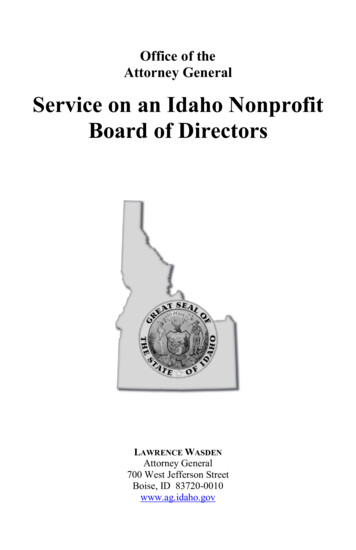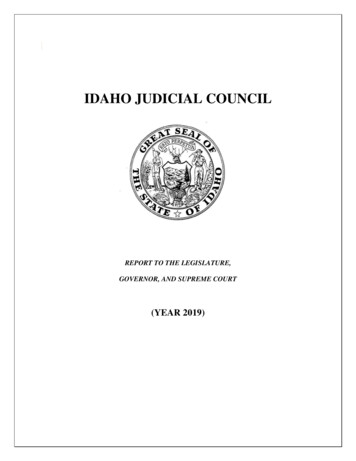
Transcription
IDAHO JUDICIAL COUNCILREPORT TO THE LEGISLATURE,GOVERNOR, AND SUPREME COURT(YEAR 2019)
TABLE OF CONTENTSPageI.Overview of Significant Events of 2019 . . . . . . . . . . . . . . . . . . . . . . . . . . . . . . . . . . . . . 1II.Introduction to the Idaho Judicial Council,Its Powers and Duties . . . . . . . . . . . . . . . . . . . . . . . . . . . . . . . . . . . . . . . . . . . . . . . . . . .2III.Selection of Judges . . . . . . . . . . . . . . . . . . . . . . . . . . . . . . . . . . . . . . . . . . . . . . . . . . . . .7IV.Disciplinary Activities of the Judicial Council . . . . . . . . . . . . . . . . . . . . . . . . . . . . . . .14V.Ethics Opinions . . . . . . . . . . . . . . . . . . . . . . . . . . . . . . . . . . . . . . . . . . . . . . . . . . . . . .16VI.Appendix A - Complaint FormAppendix B - General Rules of the Idaho Judicial CouncilAppendix C - Code of Judicial Conducti.
I.OVERVIEW OF SIGNIFICANT EVENTS OF 2019A.Council Budget. The Judicial Council accomplished all of its statutory dutieswithout salaried employees, and with a budget of 130,800.00. (See page 3)year.B.Judicial Vacancies.(See page 8)C.Discipline.(See page 14)judges.There were three (3) judicial vacancies in the 2019 calendarIn calendar year 2019, there were 81 complaints against Idaho judges.D.Ethics Opinions.(See page 17)The Judicial Council provided 8 informal ethics opinions toCOUNCIL ACTIVITIES FOR 2019Total Number of Meetings9Number of Telephone Conference Call Meetings5Number of Applicant Interviews24Number of Formal Adversarial Hearings0Number of Complaints811.
II.INTRODUCTION TO THE IDAHO JUDICIAL COUNCILThe concept of a Judicial Council, consisting of a small reform committee, was introducedat Massachusetts in 1919. The Massachusetts Judicature Commission was directed by the statelegislature "to investigate the judicature of the commonwealth with a view to ascertaining whetherany and what changes would insure a more prompt, economical and just dispatch of judicialbusiness." In 1929, a similar council was created, and was shortly thereafter allowed to lapse, inIdaho.Idaho rejoined the reform movement and created the present Judicial Council, byenactment of Title I, Chapter 21, of the Idaho Code, in 1967. Drawing from the experiences ofother states, the legislature provided in Idaho Code Section 1-2102 a broad range of functions.Today the Judicial Council is charged to:(1)Conduct studies for the improvement of the administration of justice.(2)Make reports to the Supreme Court and Legislature at intervals of not morethan two years.(3)Submit to the Governor the names of not less than two nor more than fourqualified persons for each vacancy in the office of Justice of the Supreme Court,Judge of the Court of Appeals, or District Judge, one of whom shall be appointedby the Governor.(4)Recommend the removal, discipline and retirement of judicial officers(including members of the Industrial Commission).(5)Perform such other duties as might be assigned by law.To better enable the Judicial Council to perform its functions effectively, and to enhancepublic confidence in the Council, the legislature created a geographically and politically balancedstructure. Idaho Code Section 1-2101 provides as follows:1-2101. Judicial council - Creation - Membership -Appointments- Vacancies. - (1) There is hereby created a judicial council whichshall consist of seven (7) permanent members, and one (1) adjunctmember. Three (3) permanent attorney members, one (1) of whomshall be a district judge, shall be appointed by the board ofcommissioners of the Idaho state bar with the consent of the senate.Three (3) permanent non-attorney members shall be appointed bythe governor with the consent of the senate. If any of the above2.
appointments be made during a recess of the senate, they shall besubject to consent of the senate at its next session. The term of officefor a permanent appointed member of the judicial council shall besix (6) years. Vacancies shall be filled for the unexpired term in likemanner. Appointments shall be made with due consideration forarea representation and not more than three of the permanentappointed members shall be from one (1) political party. The chiefjustice of the Supreme Court shall be the seventh member andchairman of the judicial council. No permanent member of thejudicial council, except a judge or justice, may hold any other officeor position of profit under the United States or the state. The judicialcouncil shall act by concurrence of four (4) or more members andaccording to rules which it adopts.(2) In addition to the permanent members of the judicial council,whenever there is an issue before the council which involves theremoval, discipline or recommendation for retirement of a districtcourt magistrate, the chief justice shall appoint an adjunct memberof the judicial council, who shall be a district court magistrate. Forall purposes for which the adjunct appointment is made, the adjunctmember shall be a full voting member of the judicial council.Today, the Judicial Council consists of the Chief Justice (non-partisan), a district judge(non-partisan), two lawyers (one Republican and one Democrat), a businessman (Republican), abusinesswoman (Republican), a retired educator (Democrat), and the adjunct member is amagistrate judge (non-partisan).Members of the Judicial Council serve without salaried compensation for their services.Members, other than judges, receive only a daily honorarium for each day the Council meets andreimbursement for their actual expenses, pursuant to Idaho Code Section 1-2104. The JudicialCouncil utilizes the services of a part-time Executive Director and a legal assistant.Ordinarily, the Council meets approximately five or six times per year or, as needs arise.In an effort to operate within the Council's budgetary allowance, many matters are disposed of bytelephone conference call or by mail and meetings scheduled in conjunction with interviews forjudicial vacancies.3.
BIOGRAPHIES OF COUNCIL MEMBERSAND EXECUTIVE DIRECTORJUDICIAL MEMBERS:CHIEF JUSTICE ROGER S. BURDICK, is the Ex-Officio Chairman of the Idaho JudicialCouncil. Justice Burdick received his Bachelors of Science degree in Finance from the Universityof Colorado in 1970 and graduated from the University of Idaho School of Law with a JurisDoctorate in 1974. From 1970 to 1971, he worked as a bank examiner with the Idaho Departmentof Finance. From 1974 to 1980, he worked with the law firm of Webb, Pike, Burton & Carlson inTwin Falls, Idaho, then as Deputy Prosecuting Attorney in Ada County, and finally as a partnerwith the law firm of Hart and Burdick, in Jerome, Idaho.While with Hart and Burdick from 1976 to 1980, he served as a Public Defender in Camas,Lincoln, Jerome and Gooding Counties, as well as a general practice. In November 1980, he waselected as Prosecuting Attorney for Jerome County. From September 1981 to September 1993, heserved as Magistrate Judge in Jerome County. During that time, he was appointed the firstMagistrate member of the Idaho Judicial Council, President of Idaho Magistrate Association andChairman of Juvenile Rules Committee, as well as numerous other committees.In September 1993, he was appointed District Judge in Twin Falls County and has servedon various Idaho Supreme Court advisory committees, including Chairman of I.A.R. 32 RulesCommittee. He again served on the Idaho Judicial Council from 1995 to 2001 as the District Courtmember. He served as President of the District Judges Association from 2001 to 2003. In 2001, hewas assigned to preside over the Snake River Basin Adjudication. In January 2001, he wasappointed the Administrative Judge for the Fifth Judicial District.In August, 2003 he was appointed to be the fifty-third Justice of the Idaho Supreme Courtby Governor Dirk Kempthorne. He was retained by popular election in 2004 and won a state-widecontested election in 2010. He recently was retained by uncontested election in 2016. He nowserves as chair of the Idaho Appellate Rules Committee. He has served as Co-Chair of theAppellate Time Standards Committee of the Conference of Chief Justices. He was appointed ViceChief Justice of the Idaho Supreme Court in 2007. He served a term as Chief Justice from 2011 to2015 and was reelected to that position by his peers for a four-year term starting in 2017.HONORABLE JEFF BRUDIE graduated from the University of Idaho College OfEngineering in 1981 and from the College of Law in 1984. From 1984 to 1994 he was in privatepractice in Lewiston. From 1994 to 2001 he was employed by Regence BlueShield of Idaho(formerly Medical Service Bureau of Idaho) as Staff Attorney and subsequently Vice Presidentand General Counsel.In 2001, Judge Brudie was appointed by the Governor as a District Judge for the SecondJudicial District, chambered in Lewiston, Idaho.4.
Judge Brudie served as Second Judicial District Administrative Judge, from 2009-2012and again from 2015-2018. In 2017 he was elected President of the Idaho District JudgesAssociation for a two-year term. Judge Brudie was appointed to serve as a member of the JudicialCouncil on March 7, 2018.HONORABLE LAMONT BERECZ received his Bachelor's of Art degree from AndrewsUniversity in Michigan, and his Juris Doctor degree from the University of Virginia School ofLaw. From 2000-2001, he was in private practice in Boise, Idaho with the firm of Stoel Rives andin 2001was employed with the Ada County Prosecutor's office where he handled everything fromtraffic tickets to homicide cases.In 2008, Judge Berecz was appointed Magistrate Judge in Ada County. He worked in Boiseas a Juvenile Court Judge for 4 years before moving to Valley County in 2012. Judge Berecz wasappointed to serve as an adjunct member of the Idaho Judicial Council in December 2018.PUBLIC MEMBERS:J. PHILIP REBERGER, is a resident of Boise, Idaho. He graduated from Caldwell HighSchool and the University of Idaho where he earned a Bachelors of Science in Business andreceived the President's Top Senior Award. He is currently a partner in one of Idaho's leadinggovernmental affairs firms, Sullivan & Reberger. As a U.S. Navy Viet Nam veteran, he served onactive duty as Staff Pilot to Admiral John McCain, Commander in Chief, Pacific. In 2002, heretired as a Captain, last serving as Chief of Staff to the Commander, Navy Reserve SecurityGroup. Early in his career, he served on the executive staff of the Republican National Committeeunder the leadership of Former President George H. W. Bush and U.S. Senator Bob Dole. Heserved for twelve years as Chief of Staff to Idaho's U.S. Senator Steve Symms. He retired in 2003as Idaho Governor Dirk Kempthorne's Chief of Staff, a position he held since 1992 when he joinedKempthorne to manage his successful campaign for election to the United States Senate. He is aformer Presidential appointee to the USO World Board of Governors, a former Chairman of theCapital City Development Corporation and has served on various state and local governmentboards and commissions. Mr. Reberger has been a member of the Idaho Judicial Council sinceSeptember 2003.ELIZABETH CHAVEZ, has been a resident of Nez Perce County for fifty years and agraduate of Lewis Clark State College. She is married to Jerry Chavez and taught middle schoolin the Clarkston School District from 1970-2000. She is involved in her church and also severalpublic service organizations including the Lewis Clark State College Foundation and Women’sBasketball Scholarship Club, as well as a member of the Family Promise Board.Mrs. Chavez served as a member of the Idaho Legislature/House of Representatives from2006-2010. Mrs. Chavez served on the Agricultural Affairs Committee, the Education Committee,5.
and the Natural Resources Committee. Other committee work while in the Legislature includedserving on the Middle School Task Force, the Teacher Evaluation Task Force, the SoilConservation Interim Committee, and as a member of the House and Senate Sportsman’s Caucus,and Idaho Preferred Advisory Board. Mrs. Chavez was also the recipient of the 2010 PatriciaKempthorne Award for work in substance abuse awareness.Mrs. Chavez is an avid supporter of full funded accessible education at all levels, helpingfamilies and communities deal with mental illness in the same way we deal with physical illness,she supports groups and organizations which enable those with special needs, those living inpoverty and older citizens to live independently or with assistance. Mrs. Chavez joined the IdahoJudicial Council as a member in October, 2012.KATHY SIMPSON is a resident of Idaho Falls, Idaho. She grew up in Blackfoot, Idahowhere her parents had a small family farm in Groveland. Following graduation from BlackfootHigh School, she attended and received a Bachelor of Science degree from the College of Family,Consumer and Human Development at Utah State University in 1972.Mrs. Simpson has pursued a career in business that includes 13 years in the financialservices industry where she held such positions as commercial loan officer, operations manager,regional branch manager and marketing director. In 2012 she retired from the Idaho NationalLaboratory after 20 years where she managed various functions including electronic publications,the communications and public affairs division and management communications. She also servedas the interior design lead for the office of campus development.Mrs. Simpson has been active in community service over the years serving on the boardsof the Blackfoot Chamber of Commerce and United Way. She has also supported fund raising forthe Idaho Meth Project. Mrs. Simpson joined the Idaho Judicial Council as a member in July 2013.ATTORNEY MEMBERS:REED W. LARSEN, is a lawyer in private practice in Pocatello, Idaho and is a partner inthe firm of Cooper & Larsen. He received his Bachelor of Arts degree from the Brigham YoungUniversity and his Juris Doctor degree from the University of Idaho in 1985. Mr. Larsen was bornand raised in Burley, Idaho. Mr. Larsen served as the Idaho State Bar President in 2012 and as anIdaho State Bar Commissioner from 2009-2014. He has enjoyed horses and rodeo his whole lifeand is currently the Chairman of the Intermountain Professional Rodeo Association andparticipates in IMPRA rodeos as often as possible. Mr. Larsen joined the Idaho Judicial Councilin July of 2015.6.
R. BRUCE OWENS is a lawyer in private practice in Hayden, Idaho. He is a partner in thefirm Owens McCrea & Linscott. He received his Bachelor of Science degree from Brigham YoungUniversity and his Juris Doctor degree from Arizona State University, Tempe in 1972. Mr.Owens' current practice focuses on civil litigation involving medical negligence, premises liability,automobile negligence, insurance law and contracts/commercial litigation. Mr. Owens is marriedto Judith Owens and has six children. Before serving on the Idaho Judicial Council, Mr. Owensserved as past President, Treasurer, Secretary and Director for the Idaho Trial LawyersAssociation, a member of the Idaho Supreme Court Evidentiary Rules Advisory Committee, pastPresident, Vice-President and Board Member for the Idaho Law Foundation. Mr. Owens iscertified by the Idaho Trial Lawyers Association and the Idaho Bar Association as a Civil TrialSpecialist. Mr. Owens joined the Idaho Judicial Council in July of 2017.EXECUTIVE DIRECTOR:DAVID W. CANTRILL,is an Idaho native and resides in Boise, Idaho. He was born andraised in Pocatello, Idaho. Mr. Cantrill graduated from Pocatello High School, received hisBachelor of Arts degree from Idaho State University in 1966 and received his Juris Doctorate in1970 from the University of Idaho Law School. He was in the Army, including the reserves from1963-1969. In 1970, Mr. Cantrill entered private practice in Boise concentrating in litigation.He has tried cases in five states and almost every county in the state of Idaho. Mr. Cantrill is amember of the Idaho State Bar, American Inns of Court, Defense Research Institute, IdahoAssociation of Defense Counsel and is a Fellow of the American College of Trial Lawyers. Mr.Cantrill joined the Idaho Judicial Council as its Executive Director in December of 2015.III.SELECTION OF JUDGESJustice is administered by people, not by systems. The quality of justice turns, in fullmeasure, upon the competence, fairness, and diligence of the human beings selected as judges.Because the judicial system depends heavily on a quality judiciary, we need the best availablemethod for judicial selection. While there is no perfect method, a broad national consensussuggests that the best judges are identified through a merit selection process. Merit selectionenvisions a commission, composed of judges, lawyers, and laymen, submitting nominations to theGovernor for appointment. Idaho law provides such a process. Idaho Code Section 1-2102provides that the Judicial Council shall:Submit to the Governor the names of not less than two (2) nor morethan four (4) qualified persons for each vacancy in the office ofjustice of the Supreme Court or district judge, one (1) of whom shallbe appointed by the Governor.7.
This process is followed whenever new positions are created or vacancies occur prior tothe expiration of a term. However, once selected, all Idaho judges are subject to a non-partisancompetitive election or retention process.THE SELECTION PROCESS IN DETAILThe Idaho Judicial Council has a detailed and careful selection procedure. The Counciluses a comprehensive application form to elicit detailed information concerning each applicant'sprofessional background and achievements. During personal interviews, which are open to thepublic, partisan political questions are strictly avoided. Applicants are asked for their thoughtfulcomments on issues of substantive law and problems of judicial administration. A standardquestionnaire is distributed throughout the judicial district or the state, depending on whether thevacancy is on the district bench, the Court of Appeals, or the Supreme Court, asking those membersof the practicing bar and of the general public who know the applicant to evaluate the judicialcandidate upon the standards recommended by the American Judicature Society. These standardsinclude the following:1.Integrity and moral courage.2.Legal ability and experience.3.Intelligence and wisdom.4.Capacity to be fair-minded and deliberate.5.Industriousness and promptness in performing duties.6. Compatibility of personal habits and outside activities with judicial office.7.Capacity to be courteous and considerate on the bench.When all of this information has been received and digested, the Judicial Council analyzeseach applicant's mental and physical fitness to perform the duties of judicial office, superior selfdiscipline, moral courage, sound judgment, ability to weigh impartially the views of others, abilityto be decisive when required, capacity for logical reasoning, adequacy of educational background,and excellence of professional achievement. For trial court positions, the Judicial Council alsoconsiders knowledge of procedure and evidence and experience as an advocate. For appellatepositions, the Council looks for clarity of written and spoken expression. The Council also obtainsinformation from the State Tax Commission, the Idaho State Bar, a credit bureau, the IdahoSupreme Court and the Idaho Department of Law Enforcement in order to verify the integrity andbackground of each applicant.The Judicial Council's process of judicial selection is now being emulated by severaldistrict magistrates commissions, the federal bench, and, has been the subject of inquiries fromother states.NOMINATIONS BY THE JUDICIAL COUNCIL FOR 2019Judicial vacancies usually fill a large part of the Council's activities. There were three (3)vacancies in the 2019 calendar year.8.
NOMINATIONS BY THE JUDICIAL COUNCIL FOR THE PAST FIVE YEARSThe following table summarizes the screening process for judicial vacancies for the lastfive years (2019-2015).VacancyNo. ofApplicantsNo. ofNomineesIndividualAppointed2019District JudgeFourth DistrictRichard D. Greenwood94Patrick J. MillerDistrict JudgeThird District53Andrea L. CourtneyDistrict JudgeFourth DistrictNew Position104James S. Cawthon, Jr.74John C. JudgeCourt of Appeals JudgeSergio A. Gutierrez144Amanda K. BrailsfordSupreme Court JusticeJoel D. Horton114Gregory W. Moeller74Rosemary A. Emory104Steven W. Boyce4Gene A. Petty2018District JudgeSecond DistrictJohn S. StegnerDistrict JudgeFifth DistrictJohn K. ButlerDistrict JudgeSeventh DistrictGregory W. Moeller2017District JudgeThird DistrictJuneal C. Kerrick99.
District JudgeFourth DistrictPatrick H. Owens154Peter G. BartonDistrict JudgeFifth DistrictMichael R. Crabtree62Michael P. TribeDistrict JudgeFifth DistrictRobert J. Elgee84Ned C. Williamson114Jessica M. Lorello14(2 withdrew)4G. Richard BevanDistrict JudgeSixth DistrictDavid C. Nye104Rudolph E. CarnaroliDistrict JudgeSeventh DistrictAlan C. Stephens42Stevan H. Thompson10(1 withdrew)4Thomas W. Whitney84Benjamin J. Cluff144John R. Stegner4Nancy A. BaskinCourt of Appeals JudgeJohn M. MelasonSupreme Court JusticeDaniel T. EismannDistrict JudgeThird DistrictThomas J. RyanDistrict JudgeFifth DistrictG. Richard BevanSupreme Court JusticeWarren E. Jones2016District JudgeFourth DistrictTimothy L. Hansen1010.
2015District JudgeFirst DistrictBenjamin R. Simpson10(1 withdrew)4Cynthia K.C. MeyerDistrict JudgeFourth DistrictThomas F. Neville11(2 withdrew)3Jonathan M. Medema12(3 withdrew)4Molly J. Huskey10(1 withdrew)4Michael J. Reardon94Davis F. VanderVeldeCourt of Appeals JudgeKaren LansingDistrict JudgeFourth DistrictCheri C. CopseyDistrict JudgeThird DistrictMolly J. HuskeyIV.DISCIPLINARY ACTIVITIES OF THEJUDICIAL COUNCILJudges can and should meet rigorous standards of personal and professional conduct. Therole of judicial conduct agencies throughout the country is to help enforce the standards of judicialconduct. These agencies, established by the fifty states and the District of Columbia, play a vitalrole in maintaining public confidence in the judiciary and preserving the integrity of the judicialprocess. As a forum for citizens with complaints against judges, the Idaho Judicial Council helpsmaintain the balance between judicial independence and public accountability. It also serves toimprove and strengthen the judiciary by creating a greater awareness of proper judicial conduct onthe part of judges themselves, both on and off the bench.The Idaho Judicial Council generally acts only on verified complaints involving judicialmisconduct and disability. Accordingly, it does not address complaints involving a judge's legaldecisions or rulings unless there is an accompanying allegation of fraud, corrupt motive, or othermisconduct.Judicial misconduct, or the inability of a judge to perform judicial functions, represents agreater threat to the public interest than do personnel problems among public officers in general.Most elected officers are subject to the constitutional remedy of recall, but Article 6, Section 6, of11.
the Idaho Constitution specifically exempts judicial officers. Experience in other states has shownthat the alternative remedy of impeachment is ineffective except in cases of gross scandal. In anyevent, as noted by the American Bar Association, the impeachment method can be activated onlyby preliminary proceedings that approach prejudging the case, and involve methods ofdetermination that are easily politicized.The problem is underscored by the special role that courts play in our system ofgovernment. The courts, in the last analysis, are the protectors of the individual rights which giveour society its distinct character. Because the public quite understandably views justice as beingno better than the person who dispenses it, the judge who misbehaves or who is unable to performadequately brings discredit to the entire system. The fact that relatively few judges manifest suchproblems is small consolation to the public or to the other judges whose images are indirectlytarnished by the acts of a few.Conversely, the clear need for effective judicial discipline must not obscure the equallyimportant public interest in an independent judiciary. The judge who is different is not for thatreason alone, unfit. Nor is a judge incompetent, merely because of the issuance of controversialdecisions. The need for balance between judicial accountability and judicial independence puts apremium upon the fairness of disciplinary procedures.THE JUDICIAL DISCIPLINARY PROCESS IN IDAHOIdaho Code Section 1-1202 authorizes the Judicial Council to recommend the removal,discipline, and retirement of judicial officers. Section 1-2103, which prescribes the procedures bywhich this power shall be exercised, refers only to the removal, discipline, or retirement of districtjudges, court of appeals judges or justices of the Supreme Court. However, Idaho Code Section 12103A was added by the 1990 legislature and requires the Judicial Council to investigate and makerecommendations to the Supreme Court on the discipline, removal, or retirement of magistrates.The statutory change was effective on July 1, 1990. It did not affect the magistrate selection processor the right of the district magistrate commission to remove a magistrate in the first eighteen (18)months after appointment. All judges are subject to the Idaho Code of Judicial Conductpromulgated by the Supreme Court.Section 1-2103 provides that the Judicial Council may investigate a complaint against ajudge or justice and may order a formal hearing before it, after such investigation has beenconducted. A copy of the complaint form may be found in the Appendix. Following this hearing,the Council may recommend to the Supreme Court the removal, discipline, or retirement of theaccused judge or justice. Final disciplinary authority rests with the Supreme Court. Section 1-2103further provides that all papers filed with, and proceedings conducted before, the Judicial Councilare confidential. These papers and proceedings do not lose their confidential nature unless or untilthe matter is forwarded to the Supreme Court upon recommendation of the Council. At that point,the proceedings become public.12.
The rules adopted by the Judicial Council pursuant to this statutory authority provide that when acomplaint is received, the Council initially determines whether or not the complaint (a) states facts whichconstitute possible grounds for removal, discipline or retirement, and (b) is not obviously unfounded or frivolous.This is accomplished through an initial inquiry wherein the Executive Director informally obtains sufficientadditional information to allow the Council to determine whether to proceed to a preliminary investigation. Thejudge is usually notified of the complaint at this stage of the proceedings. If the complaint passes these tests, thena preliminary investigation will be conducted, and the judge or justice involved must be formally notified.Ordinarily, this investigation is conducted by the Council's Executive Director. The judge or justice is invited tomake such statements or submit such materials as may be helpful to the investigation.When the preliminary investigation has been completed, the Judicial Council determines whether or notthe investigation has disclosed sufficient cause to warrant further proceedings. If not, or if the investigation itselfhas resolved the alleged problem, then the complaint is dismissed with notice to the complainant and the judge orjustice. However, if further proceedings are warranted, the judge or justice is then served notice of formalproceedings and given an opportunity to answer.The hearing may be conducted by the Judicial Council itself, or it may request that the Supreme Courtappoint a panel of three special masters to hear and take evidence in such a proceeding and report their findingsto the Judicial Council. During the hearing, and at all other stages of the proceeding, the judge or justice is entitledto be represented by counsel. The rules governing evidence and the requirements of due process are observedduring the hearing in the same manner as in a civil court case.Following the hearing, or upon receiving the report of findings by the special masters, the Judicial Councildetermines whether good cause exists to recommend to the Supreme Court that the judge or justice be removed,disciplined or retired. If the decision is in the affirmative, the record of proceedings is transmitted to the SupremeCourt together with the Judicial Council's recommendation. The Court may order the judge or justice removedfrom office, involuntarily retired from office, or disciplined. Pursuant to Section 1-2103 and the Judicial Council'srules, no judge or justice who is a member of the Council or Supreme Court may participate in any proceedingsinvolving himself or herself, or any district judge in his or her own judicial district.Two especially significant features of the foregoing process are the confidentiality of proceedings beforethe Judicial Council and the undertaking of a preliminary investigation prior to any formal hearing. Theconfidentiality provision serves two purposes: (1) the complainant is not deterred by fear of public embarrassmentfrom bringing a personal grievance to the attention of the Judicial Council; and (2) the reputation of the judge orjustice is protected during the period of time when the truth of the complaint is undetermined. Furthermore,confidentiality allows a judge or justice to recognize a mistake, if one has been committed, and rectify it to thesatisfaction of the complainant before publicity "freezes" the case into an adversary mold. Similarly, thepreliminary investigation provides a framework in which issues can be defined, and in many cases resolved,before formal proceedings are commenced.In many cases, the Judicial Council finds that the judge or justic
Chairman of Juvenile Rules Committee, as well as numerous other committees. In September 1993, he was appointed District Judge in Twin Falls County and has served on various Idaho Supreme Court advisory committees, including Chairman of I.A.R. 32 Rules Committee. He again served on the Idaho Judicial Council from 1995 to 2001 as the District Court
